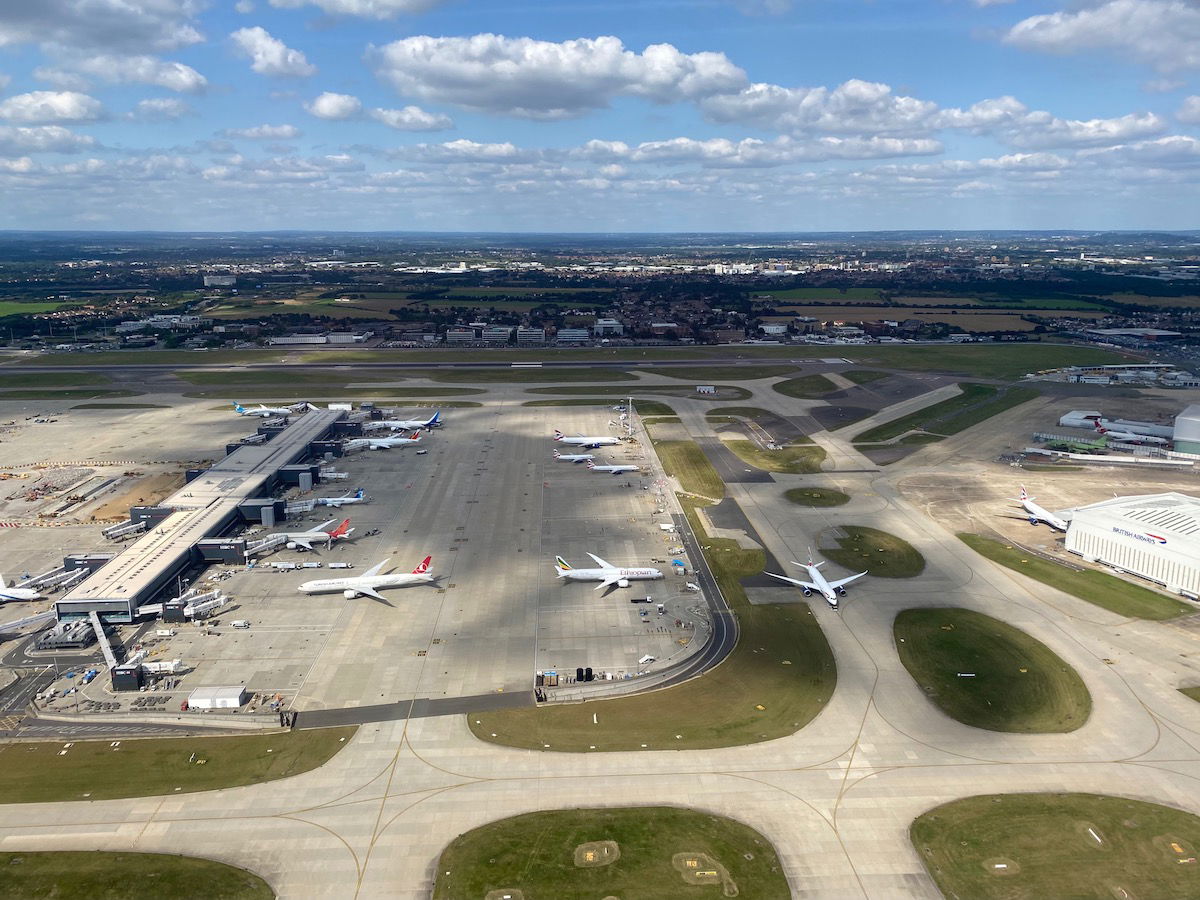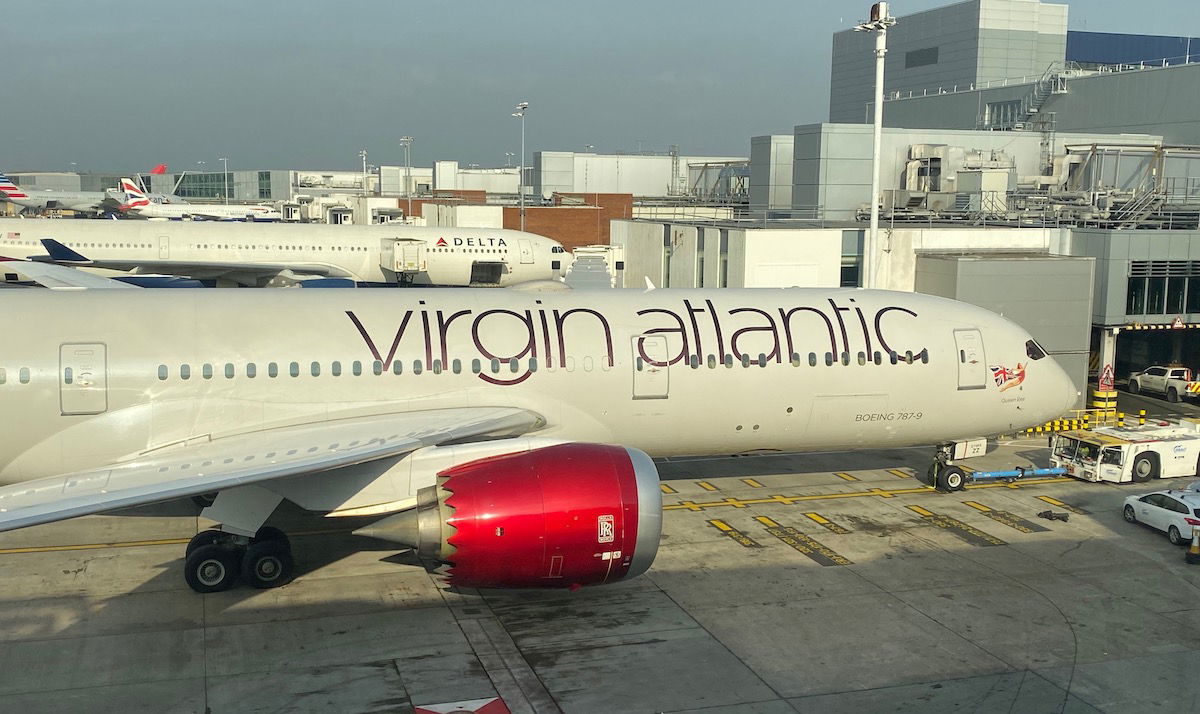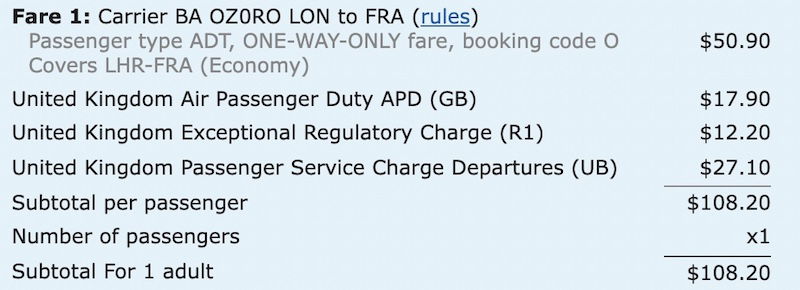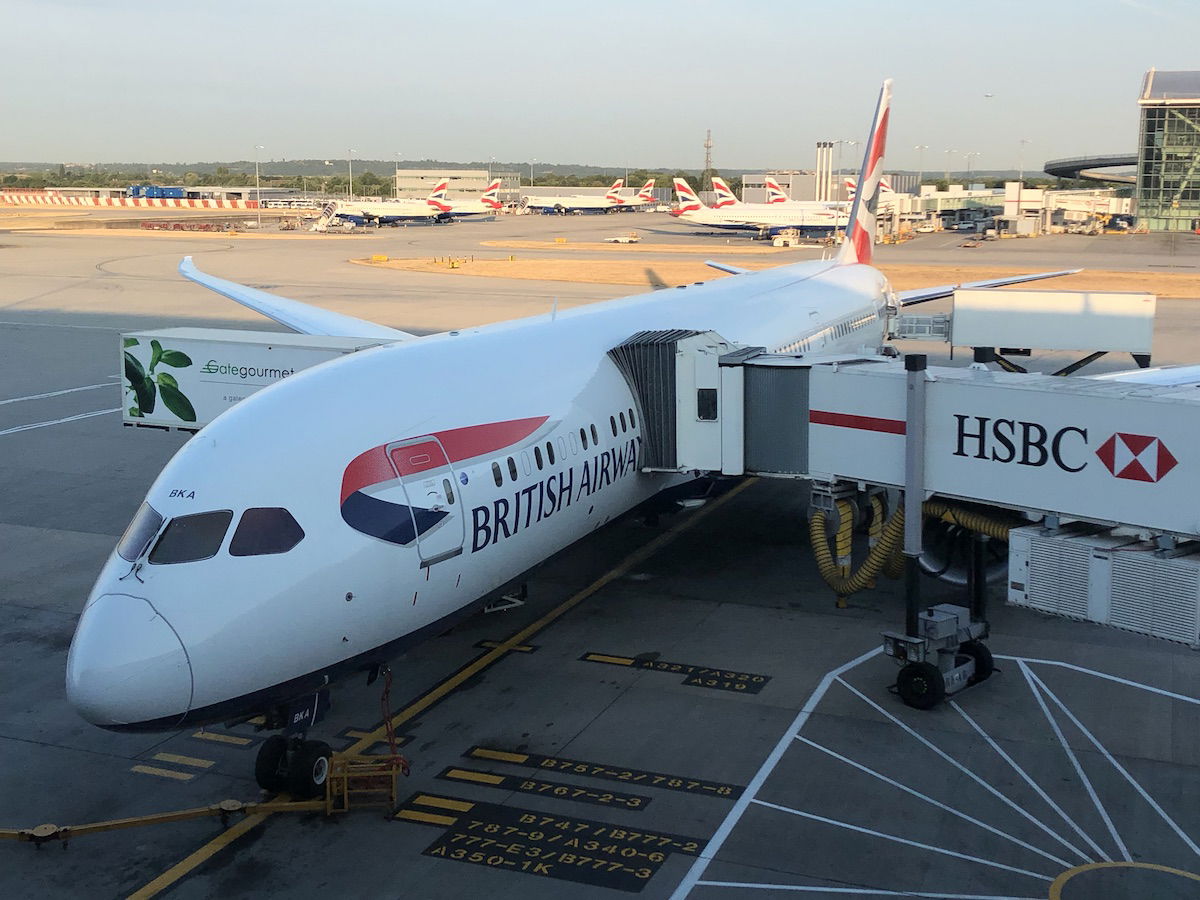The United Kingdom is the most expensive country in the world to fly out of, thanks to the Air Passenger Duty that’s levied on flights. That doesn’t even account for individual airport taxes and passenger charges, which can also be steep.
In October 2021 we learned how London Heathrow, the UK’s busiest airport, planned on increasing fees for travelers significantly in 2022. Airlines and the airport were at odds over this change, so a compromise has now been reached.
In this post:
Heathrow passenger charges increasing January 1, 2022
Pre-pandemic, London Heathrow Airport (LHR) had a passenger charge of up to £22 per person, which contributes towards operating terminals, runways, baggage systems, and security.
Earlier this year, Heathrow Airport executives revealed that they wanted to raise the passenger charge to as much as £43 over the next several years. Airline executives were furious about this, since those higher fees need to be bundled into ticket prices, and will reduce demand and margins for airlines. So the UK’s Civil Aviation Authority (CAA) has been mediating this issue, and has now made a decision.
As of January 1, 2022, Heathrow Airport will be able to increase the passenger charge to up to £30.19. That’s a 37% increase over pre-pandemic levels. Even worse is that this is only an interim solution, and we’ll see even more of a passenger charge hike later in 2022. As the CAA describes this:
“This value is in line with our consultation and reflects the uncertainty of the recovery of passenger volumes at the airport from the pandemic, particularly following the emergence of new information about the omicron variant of Covid-19 since the end of the consultation period.”
Both Heathrow Airport and airlines aren’t happy with the CAA’s decision. Heathrow Airport wanted the fee to be even higher, while airlines didn’t want the fee to increase this much.

Second Heathrow passenger charge hike coming in mid-2022
The new passenger charge applies for the first six months of 2022, and is just an interim solution. So currently a five year plan is being worked on for the Heathrow passenger charge to be increased.
Heathrow Airport wants to raise fees to the range of £32 to £43 over that period, though it’s anyone’s guess if that becomes a reality. So far, the CAA has suggested that the passenger charge could potentially be increased to £34.40 by 2027, so that’s a milder increase than what the airport is hoping for.
Heathrow Airport executives have argued that the coronavirus pandemic has severely decreased the demand for air travel, which reduces funding for the airport, and puts the airport’s long-term projects at risk. The airport had a £2 billion annual loss in 2020. Of course the airport was a cash cow before that, and the airport wasn’t exactly putting aside money for a rainy day. Now the airport wants consumers to pay for that.

Airport fees are a tricky topic
Understandably, relations between airports and airlines can be contentious. On the one hand, they have to work together, and want to offer a good experience for passengers. On the other hand, airlines are responsible for adding a vast majority of taxes & fees to the cost of a ticket, and at some point that starts to impact demand.
There’s a limit to what consumers are willing to pay, especially for a quick weekend getaway. Take a one-way British Airways fare from London Heathrow to Frankfurt, which has a total price of $108.20. In reality, only $50.90 of that is actual airfare, while $57.20 of that is taxes & fees (and these are real fees, and not carrier imposed surcharges).

If airport taxes go up even more, that doesn’t necessarily mean the airline can just raise the fare proportionally without it impacting demand.
What complicates things even further here is that Heathrow is privately owned. Back in October, Virgin Atlantic CEO Shai Weiss pointed out that the airport’s owners have been abusing their “monopoly” position, building up substantial debt leading up to the pandemic, all while paying billions of dollars in dividends to shareholders. Now that times are tough, the airport wants passengers (and by connection, airlines) to pay.
This isn’t the first such attempt we’ve seen from Heathrow. During the pandemic, the airport has added an “exceptional regulatory surcharge,” essentially accounting for fewer travelers covering the same fixed costs.

Bottom line
As of January 1, 2022, Heathrow Airport will be increasing its passenger charge to £30.19, which is an increase of 37% over the pre-pandemic fees. That’s only an interim solution, as there are negotiations ongoing about how the fees will be increased over the next five years.
Airlines are obviously hugely impacted by passenger charges of this sort, since this needs to be rolled into the ticket cost, and when you consider that airline margins are razor thin, this can have a real impact on airlines. It really is incredible how expensive it is to fly out of Heathrow, between the airport fees and the UK Air Passenger Duty, which is potentially much bigger.
What do you make of Heathrow Airport hiking the passenger charge?





When upgrading from Economy to Club on BA using On Business, BA tried to charge me an EXTRA £200. This is straight profiteering as they already charged me £85 for Economy
It is time to "bit the bullet" instead of traveller.
In any case, I am always amazed by how British greed and British stupidity go hand in hand.
#cancel #heathrow
When the extra taxes became onerous, probably about 2010, I quit flying to/through the UK. There are other places to visit that are cheaper and probably more interesting.
Sad because I have some friends in the UK that I haven't seen and time is marching on.
The "connection" to the Maldives from LHR via Gatwick certainly didn't help matters.
The fee APD quoted here, I think is the lowest which applies to the shortest routes, and lowest cabin class (Economy).
Check out the rates for inter-continental long-haul in Business and F and it's a different story. Add on all the other charges, including BAs eyewatering fuel surcharges (or is is the more accurate 'carrier-imposed charges' ?) and you have the highest suite of charges in the world.
If you think you can...
The fee APD quoted here, I think is the lowest which applies to the shortest routes, and lowest cabin class (Economy).
Check out the rates for inter-continental long-haul in Business and F and it's a different story. Add on all the other charges, including BAs eyewatering fuel surcharges (or is is the more accurate 'carrier-imposed charges' ?) and you have the highest suite of charges in the world.
If you think you can avoid this LHR usury think again! It largely applies to all London airports and regional secondary airports in the UK. The (part) solution is to fly to DUB, CDG, ORY, BRU or even AMS on one ticket and pick up your long-haul there on another ticket.
Inward travel to the UK avoids this awful tax, but I'm sure they're working on that!
Ben isn't talking about the APD in this post - that is a separate charge altogether, which, as you note, can be easily avoided by returning from an airport outside of the UK, or from INV (the UK government waives APD for flights originating out of the Scottish Highlands).
I have to say, I transited LAX -> LHR -> CPH this past Summer. From a 'passenger' perspective, the bus-transit that took 30+ minutes and made me miss my connection (then spend 8+ hours in T5 waiting for my rescheduled connection) leaves a lot to be desired. Even if the fee weren't levied, I'd think twice about connecting. Now that they're doing this, the odds are even more remote.
It’s impossible to find 2F award tix on BA to LHR these days anyways. Luckily I have very little need to go to UK given now they don’t even bother to refund VAT to foreigners anymore. Bonjour CDG!
It has always been $$$ to go to London,...The fees are High already this is nuts....If a decrease in travel and airport use then less $$$$ should be needed Overall so no need to increase fees..But governments always raise fees and taxes and they never GO DOWN!!
Important detail that the fees discussed in this post are not being imposed/raised by the British government, rather the private corporation the government effectively gave national infrastructure away to. Conservativism! Capitalism!
We sometimes take the train to Paris and fly back from there particularly with the much higher APT for Business class. This just makes the Eurorail option even more attractive (and the icing on the cake is a romantic night in Paris as well)
Let’s not forget that LHR recently introduced a terminal drop off charge of £5 and also increased the tariffs on long and short term parking.
And they also worked with TfL to eliminate the free zone for buses around the airport earlier this year, too, so even taking a public bus to one of the local hotels costs the going rate.
Heathrow doesn’t have a monopoly on air travel to and from London. Passengers can vote with their and use Stanstead and Gatwick, which is even more convenient to London.
Depends on where you live and where you what to travel to. STN is an LCC airport with no intercontinental passenger flights
Please don't take the burden on passagers who work hard and save up for a holiday much needed a £5.00 or £10.00 is ok if 1 million pay £10.00 you get millions
This is probably a brilliant way to "Brexit" themselves from the rest of the world. But I don't care much if they increase the fee by 10X of £43 since I have been avoiding to fly our from that airport anyway. I would say the more they raise the fee the merrier for the airport.
FYI, a one way ticket airport fee, MEX-IAH for instance, is US$61.65
Yes, it is ridiculous and will get worse after the populist government cancelled the new airport at almost 40% done. ♂️
The US does not do everything right but US federally funded airports have to keep all of the revenues on airport property, preventing exactly what Virgin complains about - paying shareholders while passengers pay the price with much higher fees.
Airports are monopolies and the free market doesn't work.
The UK is what the US will be in a few years given the current leadership we both have.
Choose a different airport. There are an increase of flights that operate to/from the other airports. Heathrow is not very passenger friendly or convenient.
It’s not convenient for who ?
Great idea. I’ll go one step further. Choose another country. I will never go to a country with these types of fees.
I'm ok with price hikes if the service actually reflects that. LHR to me has it's pro's and con's:
Pros:
- The service by the ground staff are actually pretty decent, they're helpful and often just there to do their job, most travellers forget that.
- The basic facilities are pretty decent, and most of the time the facilities are clean, which is a must during these times
- E-Gates (when working)...
I'm ok with price hikes if the service actually reflects that. LHR to me has it's pro's and con's:
Pros:
- The service by the ground staff are actually pretty decent, they're helpful and often just there to do their job, most travellers forget that.
- The basic facilities are pretty decent, and most of the time the facilities are clean, which is a must during these times
- E-Gates (when working) are probably the quickest immigration facilities I've been to in some time, and close to Asia in some cases
Cons:
- The idea of priority baggage seems to be lost to the luggage staff, there has been many many times where I've cleared immigration only to wait for my luggage to come way later than the non-priority baggage to come through
- Overall, there's nothing "special" about the airport itself, unlike Singapore/HKG, and HND where there's often something unique about them. That applies to the shops as well, shops are just any other shops you can get globally
- E-gates when they don't work....horror...
Problems with priority baggage usually trace back to the originating airport staff. They should load the priority baggage in the last in baggage container. If this was not done NEVER will the unloading staff prioritize rather than dump everything.
To say that the UK is the most expensive country to depart is nonsense, once the fare itself is included. By contrast, MAD and BCN are expensive for C class fares to the Far East, which is why I generally use the cheaper AMS hub.
As far as confiscatory taxes are concerned, the UK has you beaten. Average fares are another matter, but it's to the point where only the wealthy are using the UK as a gateway to Europe from North America anymore. Transiting via another hub (BEL, CDG, AMS, MAD, LIS, FRA, WAW, etc) can be a LOT cheaper.
I'm not certain the relative pricing argument holds across fare classes for cash rates - BA business class fares are often relatively cheap but you will be flying BA - but even if true is that necessarily bad in terms of economic development model for the London region? As one of the largest airports in Europe it would be reasonable to compete on schedule, frequency and routes rather than price.
If you fly via another European city the taxes are the same unless you purchase split tickets. That can lead you into no end of problems in case of disruptions.
Hang on a minute - if you're simply transiting LHR, all these taxes are not applicable. They only apply to departures *from* LHR where the passenger is not in transit.
Any cost comparison to other hubs is therefore only down to whatever the airlines best fares are.
Knock yourself out. I already avoid LHR as it's cheaper to go through FRA or other cities, and they don't charge tax on award upgrades.
Another illustration of why privately owned airports are a terrible idea.
Yes, because CDG, MAD and EWR are all superb examples of public ownership LOL
Do your examples soak you for more money because their profits aren't fat as usual during a pandemic? Nope. Try again. LHR is a textbook example of what's wrong with private ownership of a major airport.
Yup. It's egregious that the airport pays billions in dividends to foreign investors, including Qatari and Chinese sovereign wealth funds.
Actually, no. It would egregious to expect private capital to invest into what is essentially a regional economic development project without paying a return. The alternative is to finance through the public sector and issue asset-backed bonds. Bondholders expect to get paid regardless of economic performance. Choice "C" is paying for capital projects out of current taxes from citizens - a really bad idea that doesn't match timing of costs and economic inflows. Regardless of...
Actually, no. It would egregious to expect private capital to invest into what is essentially a regional economic development project without paying a return. The alternative is to finance through the public sector and issue asset-backed bonds. Bondholders expect to get paid regardless of economic performance. Choice "C" is paying for capital projects out of current taxes from citizens - a really bad idea that doesn't match timing of costs and economic inflows. Regardless of whether you prefer private or public ownership, there's no free lunch.
how about a novel idea? The government at some level - local, regional or national - recognizes the value of airports and ensures that airports have access to capital.
US airports are generally not subsidized but they are also non-profit
The notion that good, large airports need to have private capital is complete nonsense
@Sam
A bit of context and less emotion, if you please?
The Chinese are actually the smallest shareholders here at 10% Qataris own 20%. Which means they're still vastly outnumbered by European and North American investors who get the lion's share of dividends....just saying.
Airports are incredibly expensive to build and maintain. And yes, the passenger fees should reflect that.
In the US, we dont charge enough, so massive amounts of tax funding is used to cover the deficit. Meanwhile, we complain about public transit running at a loss.
I was just reviewing plans for expansion at FAT (Fresno), and the expansion will cost $100 million. Only $6 million is coming from passenger fees. Everything else is grants,...
Airports are incredibly expensive to build and maintain. And yes, the passenger fees should reflect that.
In the US, we dont charge enough, so massive amounts of tax funding is used to cover the deficit. Meanwhile, we complain about public transit running at a loss.
I was just reviewing plans for expansion at FAT (Fresno), and the expansion will cost $100 million. Only $6 million is coming from passenger fees. Everything else is grants, which is a fancy way of saying tax money.
In a climate emergency, tax money should be used for sustainable transit, not airports. If you want to use the airport, great. Pay for it.
“Climate emergency” - lol
What a remarkably myopic position. Cities benefit enormously from the money spent by visintg travelers. Do you realize how much money is spent by travelers to London, all of which is taxed? The money they spend benefits the entire city. Thus, it is not only logical, but strategic, for tax dollars to be spent building and maintaining airports. Its an investment that ensures a stream of revenue far higher than whatever an airport tax would...
What a remarkably myopic position. Cities benefit enormously from the money spent by visintg travelers. Do you realize how much money is spent by travelers to London, all of which is taxed? The money they spend benefits the entire city. Thus, it is not only logical, but strategic, for tax dollars to be spent building and maintaining airports. Its an investment that ensures a stream of revenue far higher than whatever an airport tax would net.
That all said, this policy will clearly contribute to the financial disincentives to visit London. The more a ticket costs, the fewer people who are likely to do it. I often transit Heathrow, but I only rarely build in stopovers becuase the fees that would trigger are too prohibitive.
@Franklin, +1. I do think Heathrow has it wrong. The tax is weighted toward O&D travel, which is exactly the travel that boosts regional economic activity. I do find James' rationale reasonable in the context of connecting passengers that benefit from airport infrastructure with relatively modest surcharges. BA and Virgin benefit from passenger volumes relating to connecting passengers that far outstrips the route network that could be supported from domestic UK market. Adding surcharges on...
@Franklin, +1. I do think Heathrow has it wrong. The tax is weighted toward O&D travel, which is exactly the travel that boosts regional economic activity. I do find James' rationale reasonable in the context of connecting passengers that benefit from airport infrastructure with relatively modest surcharges. BA and Virgin benefit from passenger volumes relating to connecting passengers that far outstrips the route network that could be supported from domestic UK market. Adding surcharges on connections would align use and revenue with limited impact on regional economic development.
you do realize that US airports send billions of dollars to Washington?
those grants aren't gifts but repackaged money which was collected by FAT passengers and airlines.